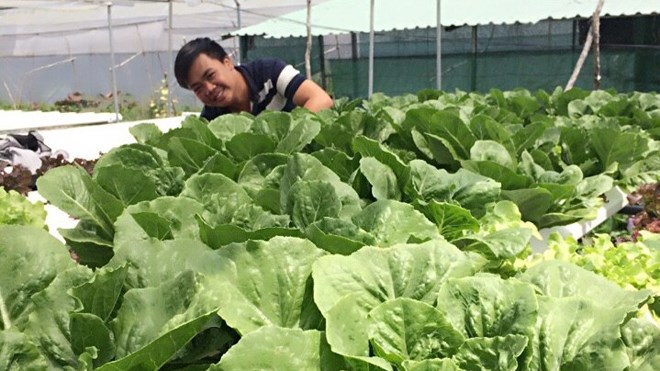|
Students use
seafood waste to grow safe vegetables
Two students in
Can Tho City are using waste from seafood processing factories to create
microbiological sludge to grow safe vegetables and ornamental flowers.

Nguyen Huu
Huy Hao, a third year student of the Can Tho Economics & Polytechnic
College, and Phan Hong Muc, a third year student of the Can Tho University of
Technology, defeated another 200 projects in the Mekong Delta to win the
first prize at the ‘Y tuong khoi nghiep’ (Ideas for startups) competition
initiated by the SIMVA Project.
Hao and Muc
were the representatives for the Mekong Delta at the national competition on
innovative entrepreneurial ideas launched by the Vietnam Student
Association’s central committee. The final round of the competition will be
held in Hanoi in March 2017.
Hao said he
had seen increasingly serious pollution caused by waste from seafood
processing factories in Ca Mau and Bac Lieu.
In early
2016, when implementing experiments on treating waste water with the teachers
at the college, he found that the waste sludge after water treatment was left
unused. The waste sludge contains many organic matters and does not contain
chemicals or heavy metals.
According
to Hao, activated sludge after sedimentation contains many good organic
substances which can be used together with other substances to grow orchids
and vegetables.
Muc said
that Vietnam is losing big resources as it cannot take full advantage of the
waste produced by seafood processing factories. If their idea of re-using the
waste is realistic, this will not only help create a new good source of
fertilizer for plants, but also help mitigate the impact on the environment.
Hao’s and
Muc’s microbiological sludge products have been used at many farms in Can Tho
City and Mekong Delta’s provinces.
Nguyen Van
Phong, the owner of a vegetable farm in Can Tho City, is trying the sludge
for the new vegetable and tomato varieties imported from the Netherlands.
“The plants
have been growing very well thanks to high nutrition level,” he said, adding
that he plans to use the microbiological sludge for the whole farm.
Nguyen Tri
Thanh in Cai Rang district, who has been using the sludge for one month,
confirmed that the proportion of nitrogen in the soil fertilized with the
sludge is three to four times higher than normal, thus helping plants grow
well and saving money for fertilizer.
Mai Chi, VNN
|
Thứ Ba, 14 tháng 3, 2017
Đăng ký:
Đăng Nhận xét (Atom)
Không có nhận xét nào:
Đăng nhận xét